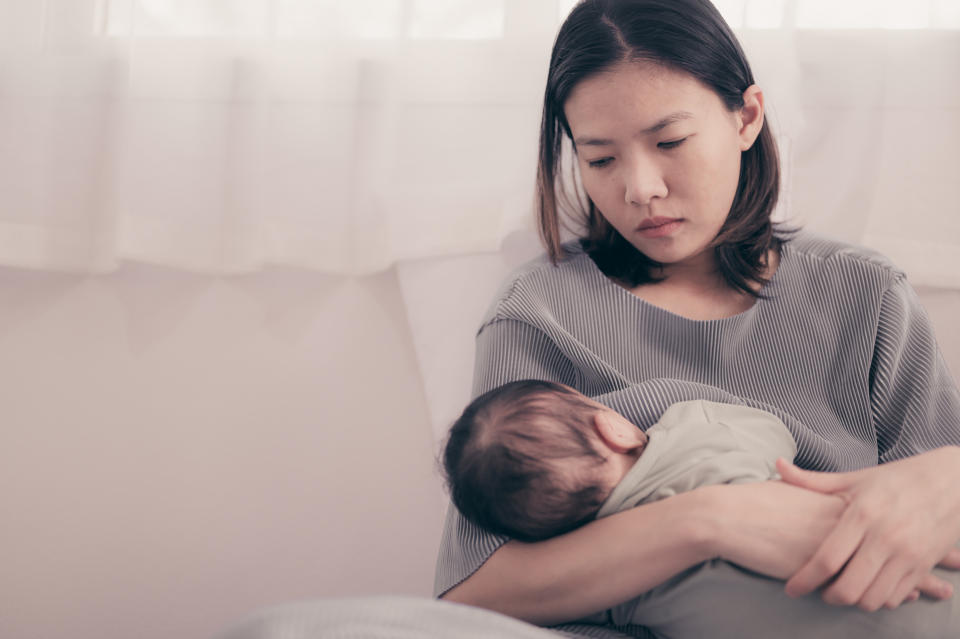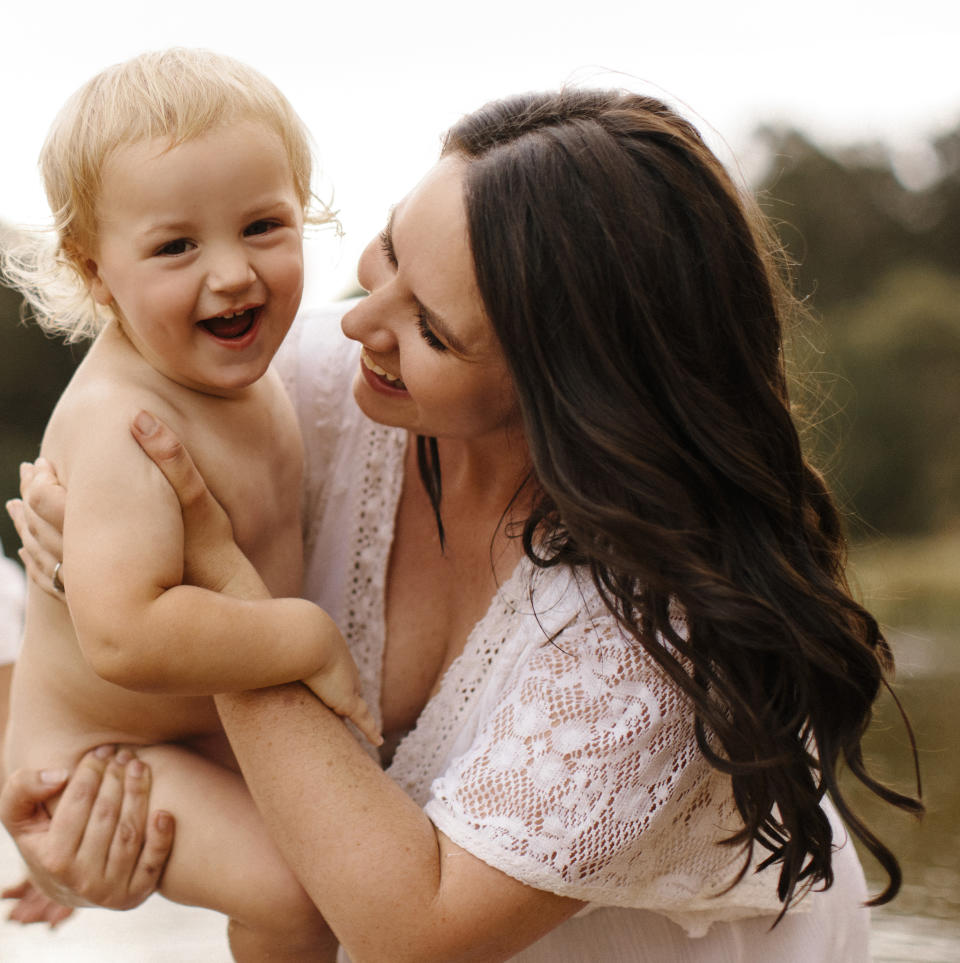'Traumatic': Mums kept in the dark on C-sections
One in three Aussie mums reports a traumatic birth experience, and it seems it could in part be down to women left in the dark when it comes to a very common type of delivery.
Australia is on a steady increase when it comes to rates of caesarean births – in 1991 around 22% of first babies were delivered via caesarean. In 2019 our percentage of caesareans hit a high of 34%.

Despite over one-third of pregnancies being delivered via C-section, however, new mums are reporting a total lack of information on the procedure and traumatic experiences of birth as a result.
“I was not given any information”: Steph’s emergency C-section
Stephanie Cannavo welcomed her first baby in 2016 through the public health system.
Planning for a natural birth, Steph ended up agreeing to being induced after her waters broke but she went hours without going into labour. She says from the moment she gave in to the pressure to induce, everything else seemed to start to spiral.
After close to thirty hours of labour, her baby was in distress and complications meant she was presented with a form to sign off on an emergency C-section.

Steph, who had attended the local hospital’s prenatal classes says until this point, thirty hours into labour, she had been given no information whatsoever on caesarean birth - either the benefits or risks.
“The hospital that I was at, the childbirth classes and the education courses that they ran, the focus was around natural birth, there was never a question or implication that you would be having a caesarean,” she tells Yahoo Lifestyle.
“[The implication was that] you would only be having a caesarean if you were high risk or if there was something going on with your pregnancy and that was decided beforehand.”
“I was not given any information about what goes on if you stop labour and go into theatre for a C-section.”
Steph, like many women, did stop labour and go into theatre.
She says when she read through the form, exhausted and distressed after hours of labour, she was confronted with brand new and frightening information.
“One of the lines on the form says you may be required to have a hysterectomy,” she recalls.
“This was the first time I had read this documentation. Having to process that at that point in time, and make an informed decision... it’s very questionable.”
Professionals say C-section experience ‘not how it should be’

Dr Kate Kerridge, Obstetrician and Gynaecologist at ‘For Women’ says Steph’s experience is quite common and reflects the damage a lack of information around C-sections is doing to mothers.
“A caesar is possible for anyone who is pregnant and [without] promoting either way, it's a case of, let's talk about if you go down this road so that you’re empowered to ask questions, [that way] they’re equipped and it's not a surprise,” she tells Yahoo Lifestyle.
“[Right now] mothers are very much empowered in terms of vaginal birth and planning for labour, but when they are having a caesarean section they become like passengers who do not have much say or much information. And that's not how it should be.”
Steph says for her it was exactly that lack of control that makes her describe the birth as ‘traumatic’.
“At the time, the part that I found difficult was that I was not prepared,” she says.
“This was not something in my plan… You’ve got people cutting you open… it’s happening and you're watching your body in the room. You have no power over what's going on. I think that's the hardest part.”
“If I had known that it was medically necessary ahead of time, I think it would have made it a less traumatic experience,” she says.
Steph, who went on to have a natural birth with her second baby, now runs a podcast about trying for a VBAC (vaginal birth after caesarean) with fellow mum Melissa Merino, who gave birth to her first baby in 2015.

Mel had a planned a caesarean for her first baby after discovering she was breech (the baby’s position meant it would emerge feet or bum first instead of head first).
In stark contrast to Steph, Mel says she had a positive experience thanks to the information she had been given ahead of time, though even then, she feels the information she was given on attempting a natural birth was limited and C-section was presented as the better option.
“I came to terms with having a planned cesarean, and it was all positive,” she tells Yahoo Lifestyle. “I got the information beforehand. The stuff Steph didn’t get, I got all of it.”
“I had a meeting with the anaesthetist, he gave me a lot of information about risks… I had all the information planned.”
“In terms of my actual C-section it was very positive. I had skin to skin, the midwife was there and put the baby on my chest, and baby stayed with me in recovery as well, which doesn’t happen a lot.”
Dr Kate says it’s this kind of approach to C-section that mums planning the procedure are exposed to that would be a huge step in making the procedure a more positive experience for women who need it.
“We just need to move on and update our practice and start listening to women,” she says.
Lack of choice at every turn slammed

It’s a lack of control that reverberates throughout the entire process of C-section.
A recent survey by Ethicon found that even something as basic as the operation’s incision closure is falling by the wayside, with 69% of expectant mums not consulted on their incision-closure options, despite over half of these mums wishing they had been.
Mel and Steph both agree that including proper information about risks and benefits of different childbirth options, including the choices within a caesarean birth, should be something available to all mothers, with both saying they believe childbirth is plagued with a lack of informed consent currently.
“Women are encouraged to do independent birthing courses, separate to the hospital to get extra information about the things that we talk about on the podcast,” Mel says. “But I feel like the system should offer more detail on risks benefits and alternatives.”
“You shouldn’t have to pay to get that information from an external birth preparation course,” she argues. “A lot of women can’t afford them.”
Many professionals are calling for an increase in continuous care for mums, whether that be a midwife or being looked after by the same professional throughout their pregnancy process.
Professor Hannah Dahlen, director of nursing and midwifery at Western Sydney University, last year told the ABC that currently, a lack of continuity of care has turned women’s experience of birth into a sort of chain of mass production.
"It's like a factory; you come in, you come out. We've forgotten there are humans there — there is no connection," she said.
Steph says at the end of the day its not about how women choose to give birth but that they feel informed and taken care of throughout the process.
“It’s not about vaginal versus caesarean birth,” she says. “I think it’s about ensuring women experience those births in a way that make them feel in control and informed about the process.”
“At the end of the day, we want healthy mothers mentally and physically when they leave that hospital, we want them to feel prepared to tackle the challenges of parenthood rather than feeling traumatised and afraid.”
Click here to sign up to our daily newsletter to get all the latest news and hacks. Or if you have a story tip, email us at lifestyle.tips@verizonmedia.com.

 Yahoo Lifestyle
Yahoo Lifestyle 




